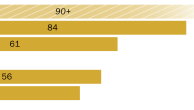Arizona last week passed a law authorizing local police to check the immigration status of anyone they reasonably suspect of being in the United States illegally.1 The law has generated sharp debate between advocates who say it is needed to combat illegal immigration and opponents who say it is an infringement on civil liberties and an invitation to racial/ethnic profiling of Hispanics by the police. In addition, some say the law will create tensions between police and Hispanics that will hinder general law enforcement.
Below are a set of recent findings from the Pew Research Center and Pew Hispanic Center that provide background on a range of issues raised by the new Arizona law. The findings are drawn mainly from nationwide surveys conducted in 2008 and 2009.
-

Americans see Hispanics as the racial/ethnic group most often subjected to discrimination:
A 2009 survey by the Pew Research Center found that nearly one-in-four (23%) Americans said Hispanics are discriminated against “a lot” in society today, a share higher than observed for any other group (Pew Social and Demographic Trends, 2010). This represents a change from 2001, when blacks were seen as the racial/ethnic group discriminated against the most in society. Then, one-in-four (25%) Americans said blacks were discriminated against “a lot,” while 19% said the same about Hispanics. - Hispanics are the ethnic group most likely to be illegal immigrants. Nationally, there were an estimated 11.9 million undocumented immigrants in the U.S. in 2008. Three-quarters (76%) are Hispanic (Passel and Cohn, 2009).
- As the number of illegal immigrants in the United States has grown, so too have the number of deportations. According to the Pew Hispanic Center, the estimated number of undocumented immigrants increased from 3 million in 1980 to 11.9 million in 2008, a four-fold increase. The increase in the number of undocumented immigrants in the U.S. coincides with an increase in the number of deportations, or removals, done by the federal government.2 According to the Department of Homeland Security, nearly 359,000 immigrants were removed in 2008, up from 18,000 in 1980.3

-

A majority of Hispanics worry that they, or someone they know, will be deported.
Nearly six-in-ten (57%) Latinos, in a 2008 Pew Hispanic Center survey, said they worried that they themselves or a family member, or a close friend may be deported. The foreign born were more likely than the native born to say this—73% versus 35% (Lopez and Minushkin, 2008). -

One-in-ten Hispanics say that they have been asked by police or other authorities about their immigration status.
According to the Pew Hispanic Center’s 2008 National Survey of Latinos, nearly one-in-ten (9%) Hispanics said they had been stopped by the police or other authorities and asked about their immigration status in the year prior to the survey, with the native born and foreign born equally likely to have said this (Lopez and Minushkin, 2008). -

A sizeable minority of Hispanics say they, or someone they know, has experienced discrimination.
According to a 2009 Pew Hispanic Center survey of Hispanics ages 16 and older, one-third (32%) say they, a family member, or a close friend have experienced discrimination in the five years prior to the survey because of their racial or ethnic background (Pew Hispanic Center, 2009). This is down from the 41% of Latino adults who said the same in 2007, but is not much different from the share of Latinos in previous Pew Hispanic Center surveys who said they or someone they know had experienced discrimination. When asked about specific instances of discrimination, 64% of Latino adults identified discrimination against Hispanics in schools as a major problem and 58% of Latino adults said the same about the workplace (Pew Hispanic Center, 2007). -

Fewer than half of Latinos say they are confident that police officers in their community treat Hispanics fairly.
According to the 2008 National Survey of Latinos, 45% of Latinos said they had a great deal or fair amount of confidence that police officers in their communities would treat Latinos fairly. This is lower than the share (74%) of whites who say police officers in their communities treat blacks and whites equally, but higher than the share (37%) of blacks who say the same (Lopez and Livingston, 2009). -

Eight-in-ten Hispanics say local police should not be involved in identifying undocumented or illegal immigrants.
According to the Pew Hispanic Center’s 2008 National Survey of Latinos, 81% of Hispanics said enforcement of immigration laws should be left mainly to the federal authorities while just 12% said local police should take an active role (Lopez and Minushkin, 2008). Among the general public, opinion is split—in 2007, half (49%) of non-Hispanics said enforcement should be left mainly to federal authorities, while 45% said local police should take an active role (Pew Hispanic Center, 2007). -

A majority of Hispanics oppose a range of other immigration enforcement measures.
In 2008, three-in-four (76%) Hispanics said they disapproved of workplace raids, 73% disapproved of the criminal prosecution of undocumented immigrants, 70% disapproved of the criminal prosecution of employers, and more than half (53%) disapproved of employees database checks to identify the eligibility of potential employees. (Lopez and Minushkin, 2008). - Hispanics in Arizona. According to Pew Hispanic Center tabulations from the 2008 American Community Survey, there are 2 million Hispanics in Arizona, representing 30% of the state’s population. One-third (33%) of Arizona Hispanics are foreign born.4
- Undocumented Immigrants in Arizona: The Pew Hispanic Center estimates that approximately 500,000 undocumented immigrants resided in Arizona in 2008.5 Nearly all (94%) of these undocumented immigrants are from Mexico. Moreover, approximately 10% of Arizona’s workforce is undocumented (Passel and Cohn, 2009).




